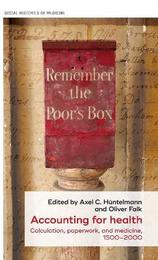
|
Accounting for Health: Calculation, Paperwork, and Medicine, 1500-2000
Hardback
Main Details
| Title |
Accounting for Health: Calculation, Paperwork, and Medicine, 1500-2000
|
| Authors and Contributors |
Edited by Axel C. Huntelmann
|
|
Edited by Oliver Falk
|
| Series | Social Histories of Medicine |
|---|
| Physical Properties |
| Format:Hardback | | Pages:416 | | Dimensions(mm): Height 216,Width 138 |
|
| Category/Genre | Economic history
Finance and accounting |
|---|
| ISBN/Barcode |
9781526135162
|
| Classifications | Dewey:362.109 |
|---|
| Audience | | Tertiary Education (US: College) | | Professional & Vocational | | General | |
|---|
| Illustrations |
53 black & white illustrations
|
|
Publishing Details |
| Publisher |
Manchester University Press
|
| Imprint |
Manchester University Press
|
| Publication Date |
29 January 2021 |
| Publication Country |
United Kingdom
|
Description
Whether in the Swiss countryside or in a doctor's office in Boston, in German, English or French hospitals or within multinational organizations, with early vaccinations or with new pharmaceuticals from Big Pharma today, or in early modern Saxon mining towns or in Prussian military healthcare - for at least 500 years, accounting has been an essential part of medical practice with significant moral, social and epistemological implications. Covering the period between 1500-2000, the book examines in short case studies the importance of calculative practices for medicine in very different contexts. Thus, Accounting for Health offers a synopsis of the extent to which accounting not only influenced medical practices over centuries, but shaped modern medicine as a whole. -- .
Author Biography
Axel C. Huntelmann is Research Fellow in the Institute for the History and Ethics of Medicine at the Charite - University of Medicine Berlin Oliver Falk is Research Fellow in the Institute of Biomedical Ethics and History of Medicine at the University of Zurich -- .
Reviews'Huntelmann (Charite hospital, Berlin) and Falk (Univ. of Zurich) have brought together a group of gifted scholars to examine the intersecting histories of accounting and medicine, including structures and practices from both endeavors, while also giving due attention to economic history. Geographically, contributors focus on Western Europe and the US. Twin emphases, on recordkeeping and the methods of book history, inform each of the fourteen chapters, perhaps because the volume emerged from a larger project on paper technologies. For instance, in three ledgers kept between 1760 and 1820, Philip Rieder finds different purposes for keeping the records but similar competitions among physicians, who billed by social group rather than by service performed; Theodore Porter explores how 19th-century asylum directors organized data in reports to the state; while Andrea Rusnock shows how medical and financial accounting were mutually reinforcing methods of demonstrating a charity's effectiveness to donors. Other chapters consider various dimensions of medical research as well as public and private insurance in the 20th century. This book is likely to influence and even inspire further academic studies on health care, with impact comparable to that exercised by The History of Mathematical Tables, as edited by Martin Campbell-Kelly and others (CH, May'04, 41-5270), on the broader histories of mathematics and computing.' --A. K. Ackerberg-Hastings, independent scholar Summing Up: Highly recommended. All readers. Reprinted with permission from Choice Reviews. All rights reserved. Copyright by the American Library Association. -- .
|